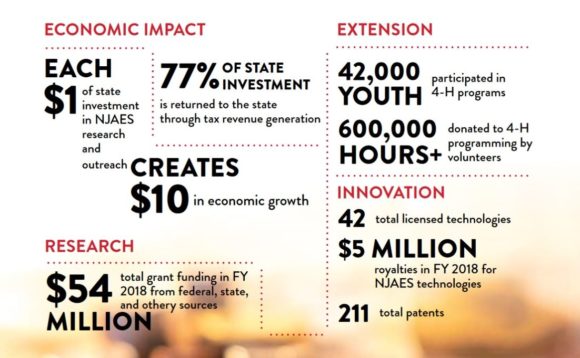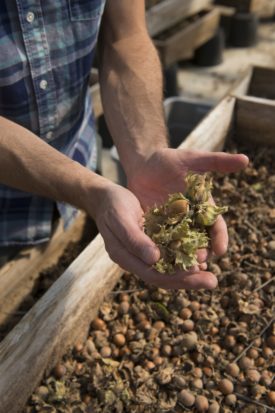
For more than 100 years, investment in New Jersey Agricultural Experiment Station (NJAES) research has sustained innovative work that strengthens economic viability and improves public health. NJAES researchers strive to gain a deeper understanding of our physical world, identify ways in which humans affect our planet and develop multi-dimensional solutions to address real-world problems. NJAES has a vigorous program of applied research and outreach through its statewide centers (for example: labs, research farms, business incubators, and extension offices).
NJAES Investment Areas include:
Agricultural Informatics
A new NJAES investment area, agricultural informatics utilizes the application of innovative technologies, data analysis and drones to increase the profitability of agricultural business through greater efficiency, more informed decision making and enhanced risk management.
Business Development, via business incubation for the past 20 years.
Targeted investment in the Rutgers Food Innovation Center and Rutgers EcoComplex has benefited over 3,000 businesses, resulting in new products, new innovations, job creation and environmental sustainability, as well as business establishment, retention and recruitment that benefit the state economy.

A new hazelnut variety is about to be released by the Rutgers NJAES hazelnut breeding program.
Cranberry Breeding Program, which was established in 1918.
As a result of long term NJAES investment, Rutgers cranberry varieties are now planted on approximately 600 of New Jersey’s 3,000 acres of cranberry bogs. Rutgers cranberry varieties yield 50 to 100 percent more than traditional varieties, resulting in additional revenues of between $2.5 and $5 million annually going directly to New Jersey cranberry growers.
Hazelnut Research, which started in the 1970s.
Now, as a result of sustained investment, an innovative agricultural sector is about to be launched that can provide new revenue-generating opportunities for New Jersey farms of all sizes.
The Oyster Breeding Program was launched with an initial investment in 1888.
This NJAES commitment was critical in initially building New Jersey’s oyster industry. Strides in this area supported industry recovery through the development of disease-resistant oysters and contributed to the revitalization of Delaware Bay water quality through oyster planting programs.
More than 100 years of investment in Vector Biology.
As a result of NJAES funded research of vector organisms, such as ticks and mosquitoes, threats to public health from pathogen transmission have been greatly reduced. The innovative mosquito control approach developed by the NJAES Center for Vector Biology has reduced populations of invasive Asian tiger mosquitoes in some areas by an impressive 75 percent.
Editor’s Note: This content first appeared in the 2018 NJAES Annual Report.

